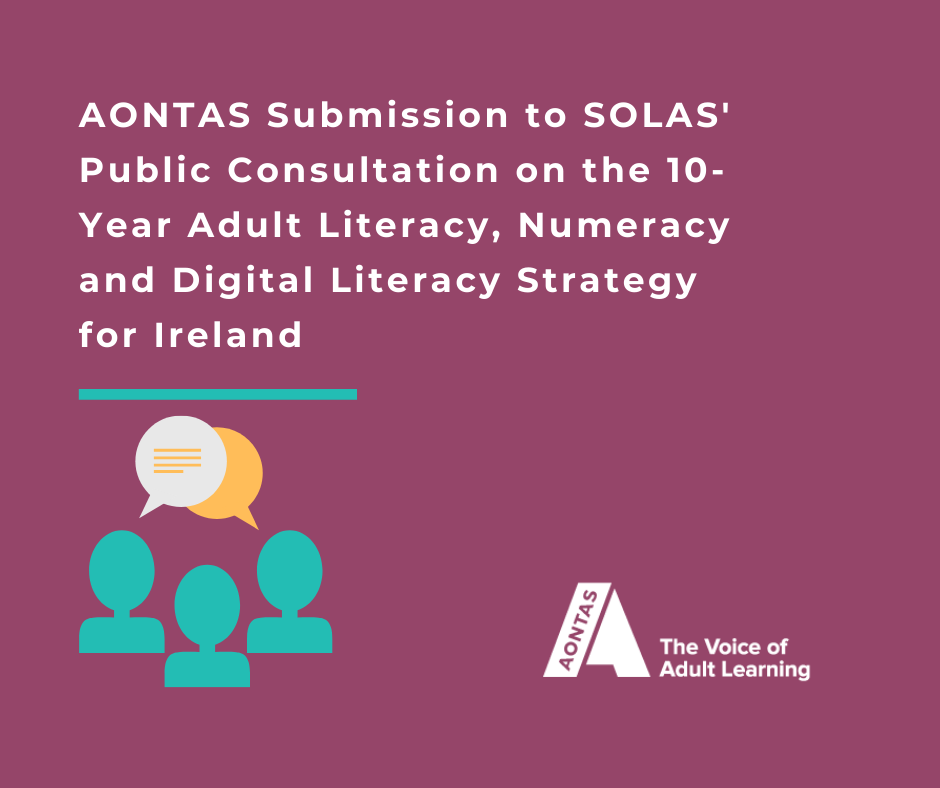The new strategy will be a very welcome policy development. When speaking about levels of Adult Literacy, Numeracy and Digital Literacy (ALNDL). Last November, Minister Harris said that
“In Ireland 1 in 5 adults in Ireland struggle with reading everyday text, such as leaflets or medicine instructions, 1 in 4 adults in Ireland struggle with using numbers, for example, using basic arithmetic for daily tasks such as adding up a grocery bill and 1 in 2 adults struggle with digital skills.”

On the international stage, according to Literacy in Europe: Facts and figures, Literacy must be considered fundamental to human development -as it enables people to live full and meaningful lives and contribute to their communities and society. Literacy is also essential for learning, as much of learning is mediated through texts. Globally, more than 796 million people have literacy difficulties according to the World Literacy Foundation. In Europe, one in five 15-year-olds and one in five 16-65-year-olds have poor reading skills. In Europe it is estimated that around 13 million children under 15 years of age and around 55 million adults between 15 and 65 years of age have literacy difficulties.
In the submission there are 5 main policy recommendations which aim to improve all forms of literacy in every community across the country. They are:
These recommendations are based on the views of adult learners and the expertise of our membership. The experience of certain key stakeholders within the sector was also garnered with the aim of supporting the development and success of the forthcoming 10-year Strategy. Ultimately, AONTAS felt that it was important for the submission to take an approach which sees literacy as a basic human right, the foundation for engaging in lifelong learning, and essential for engagement in social, civic, cultural and economic spheres of life. AONTAS made clear in the submission that it is incumbent upon all stakeholders, government departments, agencies and education providers across the tertiary system to deliver an effective, actionable 10-year Strategy that addresses the long-standing, systemic issue of adult literacy in Ireland. In addition, the submission highlights how broader macro-level structural inequalities, such as poverty and discrimination manifest in educational inequalities and that therefore these inequalities must also be tackled if Ireland is to achieve sustainable lasting positive change for all adult learners with greater ALNDL learning needs.
Finally, another important point made in this submission is that ALNDL skills not only facilitate personal development, they allow for the flourishing of healthier, creative, economically vibrant, culturally diverse and socially integrated communities. Where ALNDL improves, so too do levels of civic engagement and democratic participation. As outlined by NALA (2020) in Literacy For Life,
‘[T]his draws parallels with the capabilities approach theorised by Amartya Sen and Martha Nussbaum. The capabilities approach emphasises the role of basic education in order to provide the opportunities for “meaningful freedom” people should have to shape their lives. This understanding of “literacy” allows for a focus on “literacy for citizenship” and the promotion of literacy as the cornerstone of a well-functioning and inclusive democracy’ (2020, 12).
AONTAS has advocated for this new Strategy to appreciate that all forms of adult learning and literacies can also widen and deepen Ireland’s collective commitment to equality and social justice. These characteristics that must continue to be nourished by Government so they may come to define everyday life on this island not only for today’s population but also so they may remain embedded in the DNA of the wider educational ecosystem for the generations to come.
To download our submission, please click here.